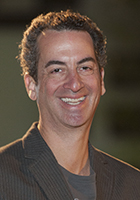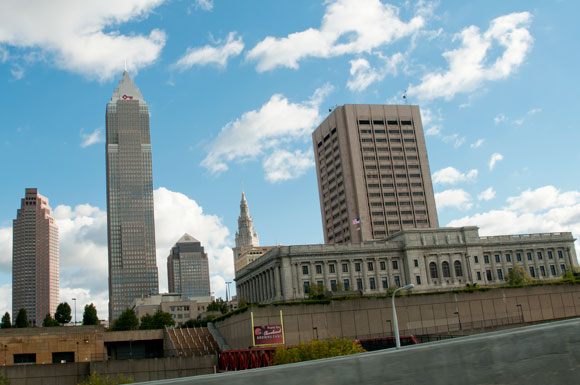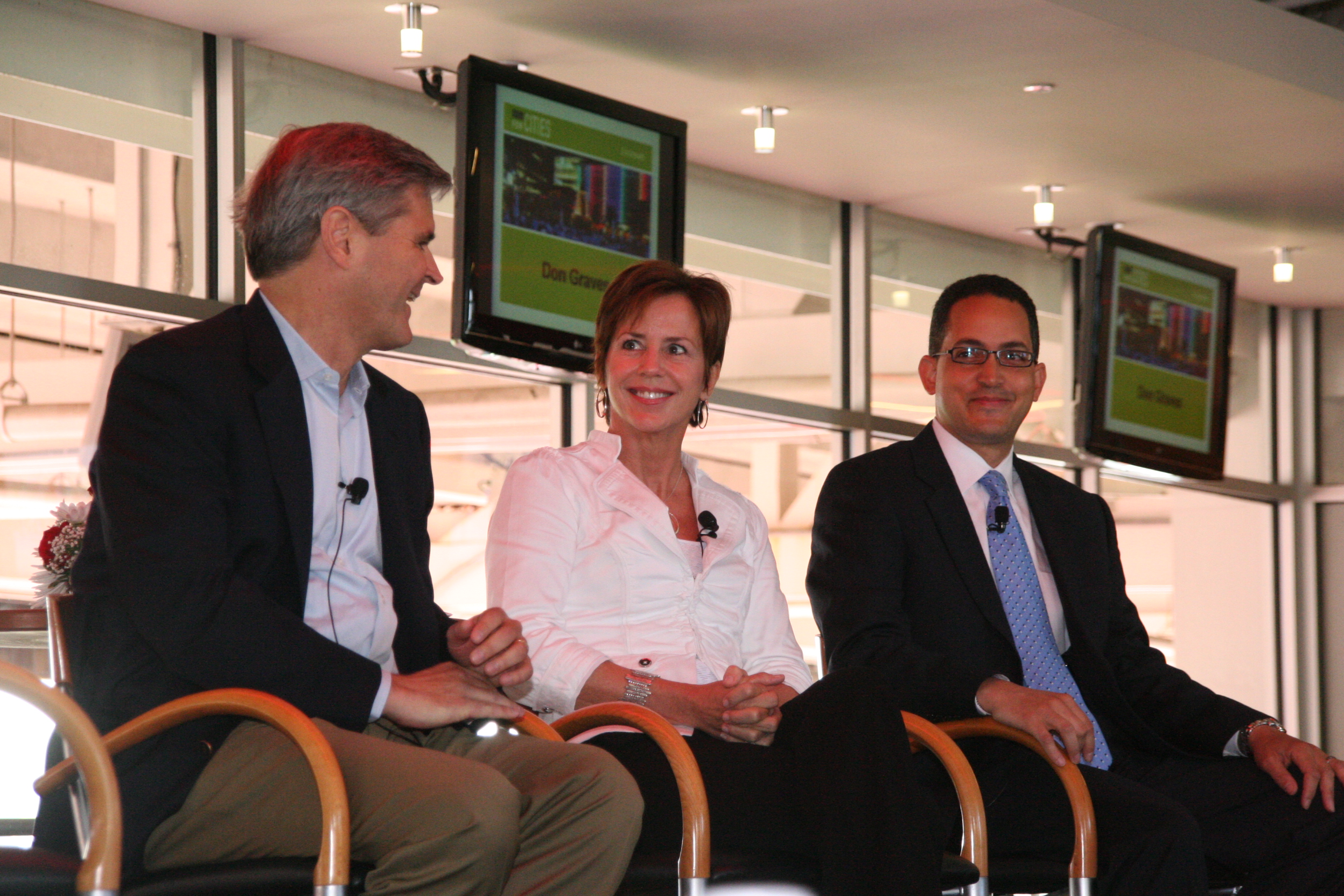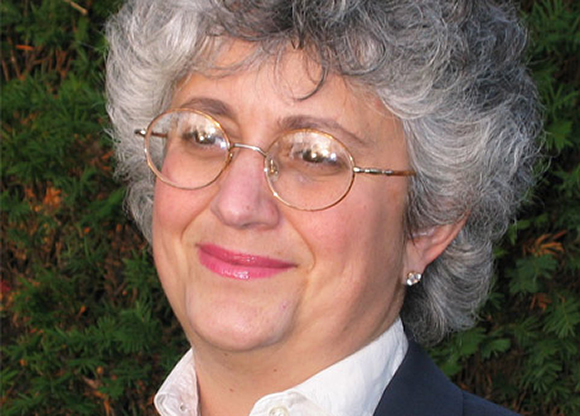cleveland 2.0: viewing our city as a startup
What if we viewed Cleveland as a startup? That's precisely what entrepreneur and technology blogger Jon Bischke argued in a recent post on TechCrunch.
"The ingredients for a successful startup and a successful city are remarkably similar," wrote Bischke. "You need to build stuff that people want. You need to attract quality talent. You have to have enough capital to get your fledgling ideas to a point of sustainability. And you need to create a world-class culture that not only attracts the best possible people, but encourages them to stick around even when things aren’t going so great."
That notion -- cities as startups -- was the focus of a recent conference for CEOs for Cities, a network of urban leaders. Strong themes emerged from the start and resounded throughout the two-day gathering, starting with AOL founder Steve Case and wife Jean's clarion call to be fearless and think big.
Case is the chair of Startup Partnership America, which unites entrepreneurs with leaders from other sectors to spur the creation and scale of high-growth firms.
Wanted: Talent. Preferably fearless.
In answer to a question about the most important thing cities can do as business generators, Case said:
"Recruit for talent and find ways to connect people. It's the role of the government to set the stage for innovation to flourish." One way to do that is to "attract the best and the brightest to establish companies here." The problem is that "the majority of Ph.D. candidates leave because they're not allowed to stay."
According to a June CNN report, 3.5 million STEM jobs (science, technology, engineering, and mathematics) in this country are going unfilled. Half of all PhDs in this country in math, computer science and economics are being awarded to foreign-borns, many of whom are forced to leave due to lack of getting H-1B visas.
Look abroad for inspiration
Instead of American cities borrowing ideas from each other, why not look to international cities and adopt their best ideas?
For example, look at Songdo, South Korea, a true start-up city.
In this planned city located 35 miles from Seoul, 1,500 new acres reclaimed from the sea were available for new development in what has become the largest private real estate venture ever (estimated at $35 billion). Not yet finished, it is a city that will run on information with a brain stem, a product of Cisco, as its hub. Intelligence is built into buildings, schools, roads, traffic and parks.
Sensors in streets and on license plates will provide a snapshot of traffic throughout the city while redirecting traffic flow through programmed lights. Cameras will monitor the number of pedestrians on streets, turning off streetlights when quiet. Garbage will be disposed of through a pressurized network of pipes, eliminating the need for pick up. Fiber optic Internet will run through every office building and home for a fully wired city.
Songdo believes that education is critically important, school design is paramount, and education not just for the young. The city promotes the concept of continuous learning to nurture existing talent while creating the optimal live-work-play plan to attract new talent.
The boundaries and limitations were ours, said Songdo's mayor while on a "Smartest City on the Planet" panel. While big thinking on a big scale drove the development, Songdo had the advantage of strong leadership in a fearless mayor who saw the vision and created conditions to make it a reality.
No risk, no reward
Unfortunately, while the model of innovative startup thinking looks at the upside of an idea, far more communities are risk-averse, focusing instead on why an idea won't work.
While major success requires certain risk, Case argued, "when most people focus on an idea, it's ways it can fail."
"There is an aversion to change in most cities," agreed Shannon Spanhake, deputy innovation officer of San Francisco. She suggested the need to mimic the disruptive behavior of startups to blast through the destructive patterns of risk aversion.
From her two-person office, for example, they "make innovation okay across all city offices. We have political capital now, turning parking lots into parklets, and creating a culture where failure is okay and disruption is cheered."
To engage residents and encourage innovative ideas, San Fran recently launched ImproveSF, an online platform from the city and county to connect -- and reward -- citizens who participate in civic challenges.
What is Cleveland 'first, best and only' at?
While every city is figuring out how to get ahead or stay ahead, the logical first place to start is to capitalize on existing assets. Figure out what you are first, best and only at to be vital, urged Joe Cortright as he introduced City Vitals 2.0, a benchmarking report on 50 cities across the country.
"What makes Cleveland unique?" asks Deborah Mills-Scofield, strategy and innovation consultant. "It has the foundational components of innovation -- the combination of rich STEAM assets (science, technology, engineering, art, math and manufacturing). While lots of cities have some of these -- and some are stronger in one area than another -- not many have the ability to combine them in unique and meaning ways, which is the root of innovation and entrepreneurship. "
As a real-world example, Mills-Scofield offers that Northeast Ohio has become the "Polymer/Hi-Tech Valley." Some of the factors that have contributed to this include world-class medical research, investment in tech transfer by area universities, innovation in higher education by community colleges, and increased seed, angel and early-stage funding.
Other unique regional assets include a rapidly growing IT, design, and new and social media sector; a thriving visual, performing and literary arts sector; a renowned culinary arts sector; and the fact that the "North Coast is a neat place to live."
"Cleveland’s growth stems from its heritage, its diversity of people, educational institutions, arts, sciences, skills and recreation," states Mills-Scofield. "Innovation comes from all these areas -- in themselves and in combination. All of these are why Cleveland and Northeast Ohio has become a great place to start a business and a life."
Talent + Strong Leadership = Innovation
Bring in the best talent and make sure to connect them to your city in deep and meaningful ways, said Josh McManus of Little Things Labs, an innovation lab on city issues. His advice? Think small: A lot of small ideas can lead to big change.
"We see people as an asset. First and foremost that is what we do," said San Francisco's Spanhake. "How do we create more supply? Better universities. More demand? Creating users and buyers of technology." Better yet, she asks, "How can we reduce barriers to working with startups?"
In theory, it all sounds workable. While many agree on the strategies that could flip thinking in most cities, they also agree on the imperative for strong leadership to create the right culture for these ideas to flourish.
"Figuring out conditions of innovation is very hard," noted Spanhake, whose following comment when viral on Twitter. "Vitality in a city is about bringing diverse groups of people together and letting them have sex."
You get the idea.
Where to begin?
"Want to change the world? Start with your city," suggested Lee Fisher, chief executive of CEOs for Cities in his presentation. "Want to change your city? Act and think like a startup."
"Have you wondered why MySpace didn't create Facebook? Why Microsoft didn't create Google? Why Blockbuster didn't create Netflix?," he asked the room. Because at some point they stopped acting and thinking like startups, he said.
"Darwin's theory has never been more relevant: Survival isn't about strength -- it's about the ability to adapt, reinvent, and be responsive to change."
Cities, he offers, are big enough to make a difference but small enough to make things happen quickly and effectively.
Tracy Certo is publisher and editor of Pop City.
- Image 1: Cleveland - Photo Bob Perkoski
- Image 2: Steve Case, Jean Case, Don Graves - Photos courtesy of CEOs for Cities
- Image 3: Shannon Spanhake - Photos courtesy of CEOs for Cities
- Image 4: Deborah Mills-Scofield





